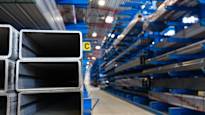European sick man.
Germany was called such in the late 1990s, when the country struggled with extensive unemployment and other financial difficulties after the reunification.
Now the name is timely.
Germany is once again a country whose economic situation dysfunctions in the entire continent’s economy. Europe’s largest economy has been reduced for two consecutive years.
The German economy tentacles extend widely. They are also felt at a factory in Lahti, where various stainless steel beams are made for the needs of the means of transport, energy and, for example, the food industry.
Germany is an important export country for a company called Stalatube.
Managing director Sami Packalén However, it says that in recent years its role has decreased. Steel beams have not been taken to Germany in the same way as, for example, ten years ago. One of the reasons for this is in the country’s weak economic situation, which has led to less orders from Stalatube customers.
-We will see it in the sale of the whole of Central Europe. The old saying that Germany is the locomotive of the European economy is still true.
“In very deep problems”
On Sunday, premature general elections will be held in Germany. They are of great importance for the political development of Europe as a whole, but elections are also important for the European economy.
In Finland, the business community closely follows the direction of Germany, and it is no wonder. Germany is one of the most important trading partners in Finland.
Director of International Trade of the Confederation of Finnish Industries (EK) Timo Mountain emphasizes that German up and downhill hills are inevitably reflected in Finnish companies.
In particular, metal products, transport equipment and machinery and equipment are exported from Finland to Germany. Thus, Finland’s export products are closely related to industry, and it is precisely the German industry that has gone poorly in recent years.
Industry plays a big role in the entire German economy, and industry problems are largely due to the difficulties of the national economy, the Bank of Finland’s Economist Seija Parviainen says.
– The German economy is very deep and there is no rapid solution.
The background of difficulties in many reasons
So what are the problems of German industry?
One of the key causes is the wrong energy policy. Germany has relied too much on cheap Russian gas, Parviainen says.
As the Russian offensive war began, Germany has had to look for substitute forms of energy, but there is no alternative to nuclear power, as Germany decided to give up it many years ago.
Another problem is in economic structures. According to Parviainen, Germany should be able to diversify very much about its industry -based economy.
The problem is also a shortage of skilled workers and incomplete investments, such as infrastructure. German companies also feel that there is too much bureaucracy in the country and that the labor market is too stiff, Parviainen lists.
Finns are waiting for reforms
The future German government will not be able to solve all problems in the country’s economy.
A senior researcher at the Institute for Foreign Affairs Tuomas Iso-Markku It emphasizes that the country’s economic difficulties are also based on global uncertainty and the intensification of relationships between great powers. These factors cannot influence the German government alone.
According to Iso-Markku, the economy is worrying about German voters, but in recent weeks the topic has remained at the feet of other themes, especially immigration policy.
One big question in the electoral debates has been how parties treat the German debt brake, which restricts the highest deficit to 0.35 % of the country’s gross domestic product.
Debt brake was one of the reasons for the Chancellor Olaf Scholzin government crisis. Christian Democratic Friedrich Merz It has said that the country could consider a reform of the law that curb debt, but only if a loan is taken for investment. Merz is considered a likely new Chancellor.
Investments and reforms are also awaiting Finnish business.
EK’s Timo Vuori hopes that a government will be available in Germany, which dares to reform the country and, in addition, the European Union.
– Both need to be renewed so that we can do this in this race in the midst of great powers.
Sami Packalén, CEO of Stalatube, also hopes that the future German government will have access to how the country’s economy will rise again. However, the primary wish is that the political situation in the country would calm down.
What happens at EU tables?
The result of the German elections is reflected in Finland, especially through the European Union.
The Olaf Scholz government has had difficulty in making a common stance on the EU negotiating tables and the current Chancellor of Federal has been accused of being passive in its EU policy.
Researcher Tuomas Iso-Markku says that the current government has even decided to vote at EU tables even when government parties have not agreed on what Germany’s position is.
-A stable and functional new government would allow Germany to play a bigger role in the EU, at least so much, says Iso-Markku.
According to him, the likely new Chancellor Merz has emphasized that he would take on a more active role in EU policy and rebuild relations with EU partners such as France and Poland.
Iso-Markku believes that after Sunday’s elections, there will be a stable majority government in Germany and political turbulence will end.
– But it is by no means certain and it can take time to form a government.
The recent episode of the Political Radio will pave the German Sunday elections.
